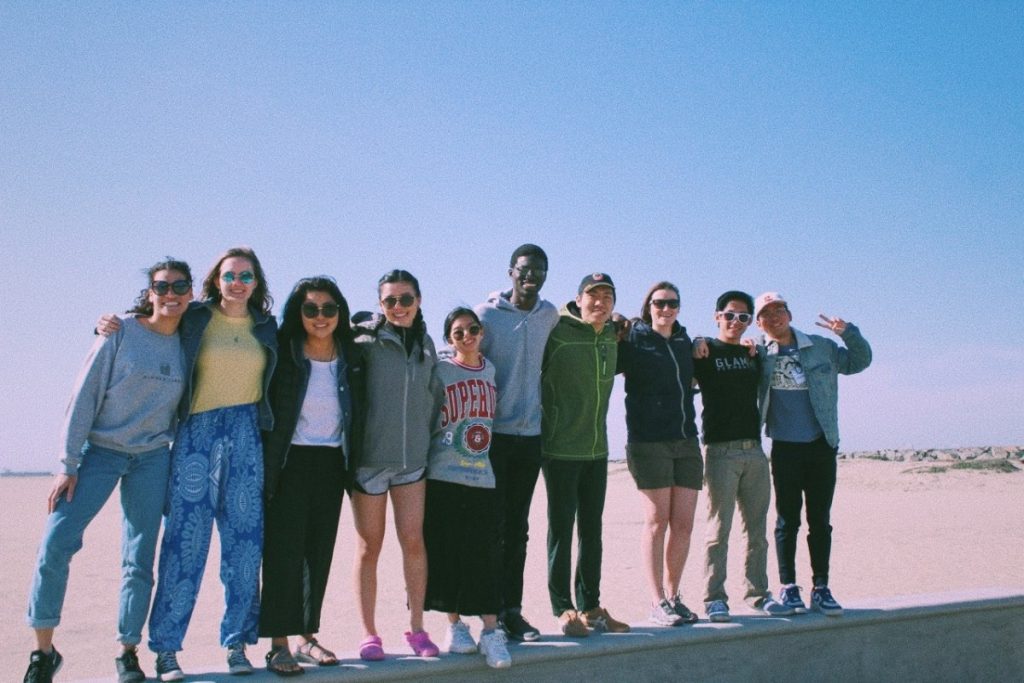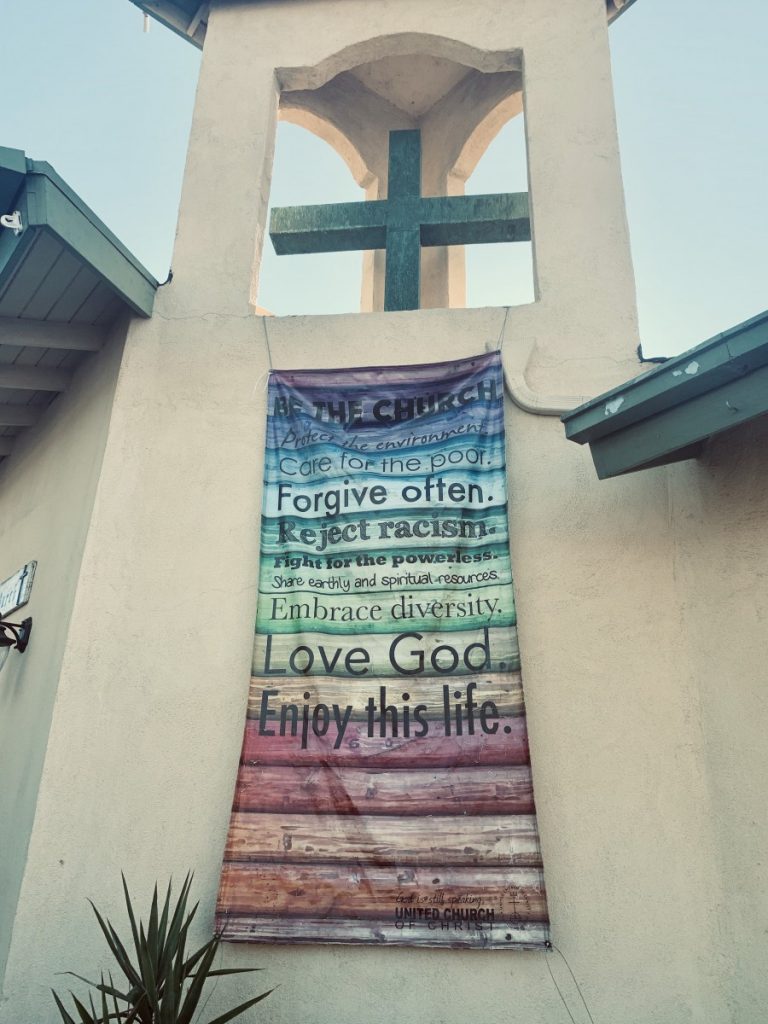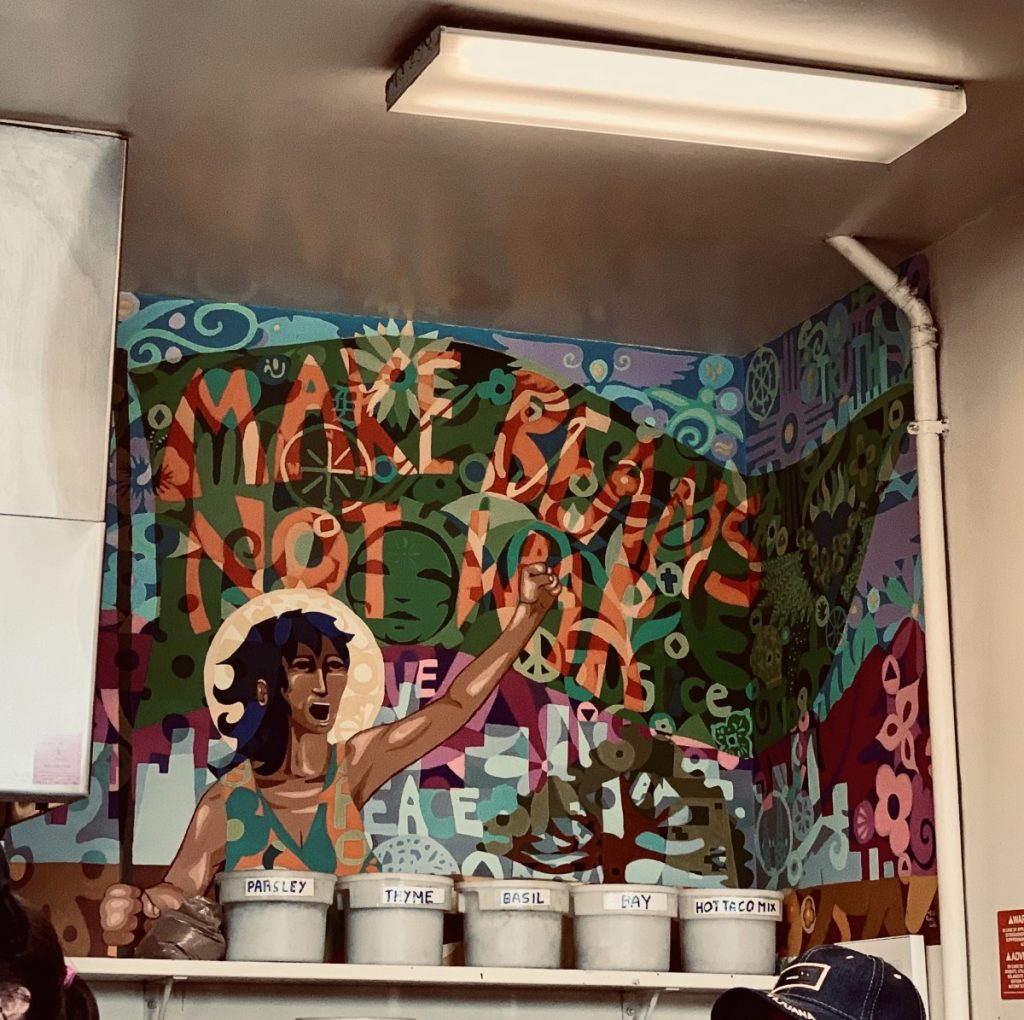I spent my February break this year a little differently. I went back to Los Angeles, the place I have been calling home for the past 11 years, with nine other Middleury students. At 6:00 p.m. on a Saturday our plane finally landed in LAX, and I felt our group’s collective excitement and eagerness to learn about the intersectionality between climate change and religion and what roles we can play in helping mitigate this global crisis. Although it is true that our trip was not the most physically demanding–we may have gone to the beach this week more than I ever have in one summer–I believe that it was one of my most intellectually and emotionally engaging experiences at Middlebury College.

On our first full day, we visited the Metropolitan Church of Christ, a church centered on Creation. The whole community welcomed all of us with open arms, reflecting the core of their sermon that day: we humans are “the salt of the earth.” They shared the message that humans are one of earth’s most valuable resources and we have a duty to be kind to each other. This kindness must also extend towards all of God’s creation. We have a duty to protect and nurture the earth and everything that resides in it because we are simply sharing the earth with other living beings. Theirs was a call for responsibility. Although this was a clear articulation of the connection between climate change in religion, the most powerful experience I had in this church was more personal.

They did the Holy Communion a little differently from other more traditional churches. We were invited to join if we desired. I took the “body of Christ” with my own hands from a tray and dipped it in the chalice filled with the “blood of Christ.” After eating this, the deacon took my hands and touched our foreheads together in a very personal prayer. My eyes started to water as her words touched my heart. She said: “Blessed be are those who are young. For they really are the hope of the future.” At that moment, I realized that the older generation places so much faith in us to do better and to take better care of our shared world.
The most physically demanding–and emotionally exhausting–day that we had came on the third day of our trip. Half of the group, including myself, worked from 7:30 a.m. to 12:30 p.m. at the Hippie Kitchen situated in the middle of Downtown Los Angeles’ notorious Skid Row. This neighborhood, called “Hell on Earth” by some, creates a stark contrast from the bustling and wealthy area of Downtown Los Angeles as you see streets upon streets filled with tents, shopping carts, trash, and items usually found inside a house. When you leave this neighborhood, you can immediately see a completely different set-up of the city: high-rise buildings, fancy restaurants, expensive apartments. As a native Los Angelena, I knew of and have seen this place in person–but only from the outside. Going inside the heart of Skid Row was, therefore, a surreal experience. I felt exposed and, admittedly, scared. When we got inside the Hippie Kitchen, I felt a sense of relief–no longer would I have to stand outside surrounded by the marginalized and unrepresented as the Kitchen’s four walls became my temporary refuge. I felt weird and I felt wrong.
Going inside the heart of Skid Row was, therefore, a surreal experience. I felt exposed and, admittedly, scared. When we got inside the Hippie Kitchen, I felt a sense of relief–no longer would I have to stand outside surrounded by the marginalized and unrepresented as the Kitchen’s four walls became my temporary refuge.
Isabella Primavera ‘21.5, MAlt LA Participant
As we rotated jobs once the Hippie Kitchen opened, I found myself serving salad to those experiencing homelessness. At this station, I distinctly remember one moment: One of the regular volunteers asked a regular patron where his wife was. He answered: “She’s in our tent today since she’s not feeling well.” That response hit me hard. In my everyday life, the “tent” would be substituted by “home” or “room,” sturdier and more personal spaces, places that are supposed to provide a comfortable shield from the outside. Hearing this man’s response, I felt a sense of shame. It was shame for being able to find comfort in going back to a comfortable house–with a bed, a heater, running water, a warm blanket–while my counterparts lived in their tents.

Before we started our shifts, we came upon the volunteers praying in a circle, holding hands. When they saw us (Middlebury students standing outside the kitchen), they opened up the circle and invited us join the prayer. The prayer, I faintly recall, was a prayer by St. Vincent de Paul–a priest who has dedicated his life to serving the poor. The prayer talked of our duties to the poor–that it is our duty to help them and even when they disrespect us, we must treat them with more kindness. I deeply respect all of the volunteers; their belief in the word of God drives their selflessness in serving the community in Skid Row. I respect those experiencing homelessness as well. Despite their situations, some of them come to the Hippie Kitchen filled with hope and gratitude. It is another day that they are alive and another day that they can eat and for that they are thankful.

There is so much that we did on this trip–so much learning, engagement, reflection–that one blog post would not be enough to talk about all of it. I’ve highlighted these two days of the trip because they contained the most impactful moments for me. While the first experience shows the direct connection between climate change and religion I experienced, the second experience shows that solving the climate crisis cannot stand in isolation from creating broader social justice. Climate change is a social justice issue. For how can the marginalized and underrepresented worry about the environment when everyday they have to worry about satisfying their most basic needs–food and shelter? This trip has made me realize that climate change is not just this abstract, global problem but a systemic problem–those who are not in the top 5% wealthiest parts of the population are the ones who experience most of climate change’s effects, but those with the most wealth are responsible for creating and maintaining most of the systems of dependence on, and actual emissions of, fossil fuels and greenhouse gasses that are causing the problem in the first place. The marginalized hold some of the fewest choices for taking personal action, too. People who need jobs must take the jobs available, even if they are in places like oil refineries. Those experiencing homelessness use single-use plastic because they don’t have access to sturdier containers. All of these complex problems are part of climate change.
Climate change is a social justice issue. For how can the marginalized and underrepresented worry about the environment when everyday they have to worry about satisfying their most basic needs–food and shelter?
Isabella Primavera ‘21.5, MAlt LA Participant
Although these issues seem so big and unsolvable–believe me, I was feeling hopeless for a while–the communities that we have seen in action are all doing their part to try to fix the system from the ground-up. Faith communities as well as normal neighborhoods are all working with the people in their communities to tackle the climate crises–the Metropolitan Church of Christ and the Hippie Kitchen are just two of these examples. Because of these groups, I have hope that we can work together to change the world for the better.